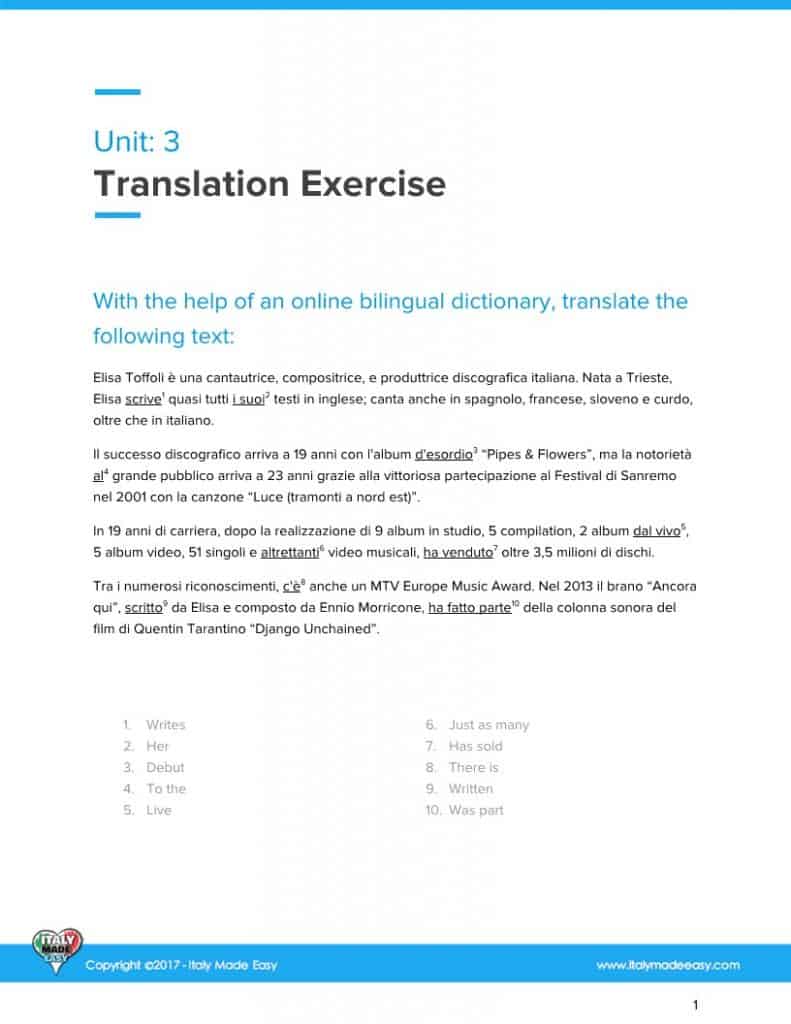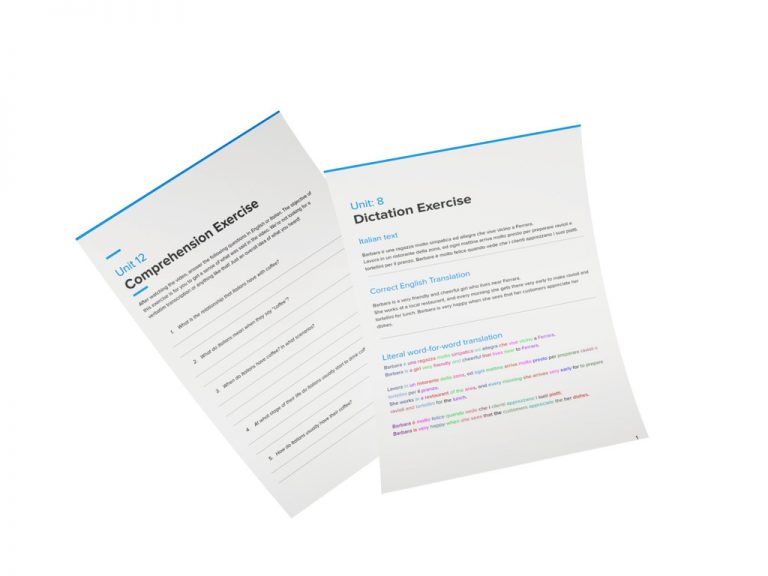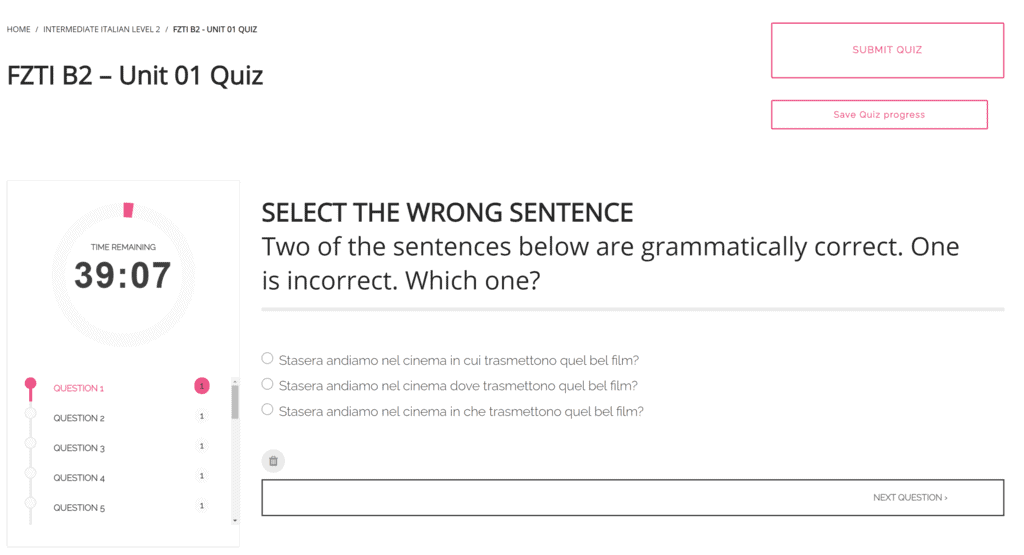From Zero to Italian
Have you always dreamed of speaking Italian fluently? Have you tried learning Italian in the past with little to no success?
Well then, you need this revolutionary program!

serious about Italian?
From Zero To Italian is the mother of all Italian programs, designed to take you from “zero” – not knowing any Italian – all the way to fluency. If you are serious about speaking Italian, then this Program is what you've been looking for.
From Zero To Italian will help you succeed where other courses, apps, and programs have failed you.
Other Italian courses focus too heavily on drilling in grammar rules, memorizing set phrases, or teaching you a bunch of vocabulary with no understanding of how to actually use it in conversation.
Our focus in From Zero To Italian is COMMUNICATION – actually learning how to speak Italian!
You'll get unlimited access to From Zero To Italian as part of your Italy Made Easy Membership.

What is From Zero to Italian?
From Zero to Italian is our Flagship Italian language program.
It is a comprehensive and sequentially-structured Italian program comprised of 8 in-depth, fun, and engaging courses.
If you really want to learn Italian successfully, you need structure, clear explanations, expert guidance and, most importantly, an Italian language mentor who has your success at heart.
That is exactly what you will get with From Zero To Italian.
We have personally witnessed many students who completed just the first course in the series and can communicate better in Italian than college graduates.
Included as part of your Italy Made Easy Membership, you'll have unlimited access to all 8 From Zero To Italian courses.
What students are saying about Italy Made Easy
Lower Levels
BUILD THE STRONGEST FOUNDATION POSSIBLE. OUR BEGINNER COURSES WILL GET YOU SPEAKING ITALIAN FASTER AND MORE CONFIDENTLY THAN ANYTHING YOU'VE EVER TRIED!
Higher Levels
From Zero to Italian continues with:
- Intermediate Italian Level 4 (coming in late 2024)
- Advanced Italian Level 1 (coming in 2025)
- Advanced Italian Level 2 (coming in 2025)
From zero to Italian is specifically designed for English Speakers

What Our students are saying
How From Zero to Italian Will Help You Succeed
Your personal success with Italian is our ultimate goal in From Zero to Italian. It's the reason Italy Made Easy exists! From Zero to Italian WILL help you get the results you want!
Here’s how:
We focus on COMMUNICATION - actually being able to speak Italian!
You will develop the necessary tools and knowledge to build your own sentences and express yourself naturally as an individual
The courses are specifically designed to meet the needs of English speakers
Created by a dedicated, qualified team of native Italian linguists
Materials are well-organized and pedagogically sound
All content is presented in a clear and concise manner
You become part of a community of thousands of students on our online forum - share experiences, ask questions and feel the support of all your fellow students who are on the same Italian journey
100% Online - you can complete it at your own pace wherever and whenever you want!
Produced by Italy Made Easy’s Founder, Manu Venditti
- Over 20 years experience in teaching Italian
-
An expert and experienced Linguist, specializing in Italian English linguistics
- A professionally trained and expert translator
- Successful polyglot (has achieved fluency in 4 languages and dabbles in a few more)
- Truly passionate about helping students of Italian actually learn to COMMUNICATE in Italian

One of the key features of From Zero to Italian is that Manu is there to guide you every step of the way. Know that you are not on this journey alone! He teaches you the tools to study and learn Italian independently so that you can become responsible for your own success on your journey to Italian fluency!

Your learning is boosted with a wide variety of additional audio and visual resources
What Do You Get in The courses?
-
Video tutorials with Manu for every lesson - So it’s just like having your own private tutor with you every step of the way.
It feels like you’re in the room with Manu. The tone is always casual, informative, humorous, honest and engaging, so you will never be bored! - A comprehensive series of practical and engaging exercises in each unit which include:

Dictation Exercises
- These provide you with a great opportunity to practice your listening and comprehension skills as you write down what you hear. They are really fun too! Word-for-word translations and real translations of each exercise help to give you a deeper understanding of how Italian works, how it is structured and how Italians see the world!

Translation Exercises
- Challenging yet fun exercises that really get you into the mindset of how Italian works and how concepts are expressed differently between English and Italian, using real material that Italian native speakers would read. These exercises are also another great way to build on the vocabulary that you have already learned.
Comprehension Exercises
- Improve your listening and comprehension skills by learning to interpret meaning in spoken Italian from very earlier on.
.jpg)
Creative Writing Exercises
- Get creative with these practical writing exercises! Put into practice key grammatical concepts and vocabulary that you have learned by writing short stories or by describing something. It’s about putting your Italian thoughts into written words!

-768x768.jpg)
Conversational Phrases
-
(Intermediate Courses)
Instantly boost your Italian with new expressions learned every week. These aren’t the typical robotic phrases you learn in phrasebooks or in most courses. They are real, colloquial phrases to add to sentences you already know. By incorporating these phrases into your everyday speech, you’ll be able to express yourself much more naturally!
Interactive Quizzes
- Every unit in "From Zero To Italian" comes with self-correcting quizzes to help you consolidate what you've learned. Solutions are there to help you with simple explanations of the correct answers.
Real Conversation Analysis
-
(Intermediate Courses)
Watch and listen to genuine conversations between real Italians discussing a wide range of interesting and relevant topics. You will be exposed to real, natural Italian as it is spoken in Italy and then analyze the words and expressions used so that you can start speaking like a real Italian too!


All of these exercises within From Zero to Italian have been meticulously created to be effective educational tools. They are designed to improve every aspect of your Italian and get you speaking just like a real Italian.
As part of your Italy Made Easy Membership, our program From Zero To Italian alone represents outstanding value! The amount of content, resources, and support in this one program is unsurpassed.
Become an Italy Made Easy member and start From Zero To Italian now! It will be the best decision you’ve ever made!

learn the basics of the Italian language step by step
How do we compare?
-
WINNERItaly Made Easy
- Private Tutor
|
WINNER
Italy Made Easy | Private Tutor | |
$480 Yearly Membership | $52002 per year3 | |
| HOURS OF TUTORING | +1201 | 104 |
| COST PER WEEK | $9.50 | $100 |
| Step-By-Step Curriculum | ||
| Progress Tracking | ||
| Learn Whenever You Want | ||
| No Commute | ||
| Take Lessons From Any Device | ||
| 24/7 Access To All Resources | ||
| Re-Watch Any Lesson | ||
| Supportive Community | ||
| Access To Multiple Native Speakers | ||
| Self-correcting Quizzes + Explanations | ||
| Share Experience With 2,000's Like-Minded Learners Of Italian | ||
| Lessons On The Go (Learn While Communiting) | ||
| Detailed Lesson Notes For All Lessons | ||
| Clear Grammar Explanation - Never Be Left Wondering | ||
| Lots Of Practice Opportunities | ||
| Will Take You To Fluency At Completion Of All 8 Courses | ||
| Clear Plan/Instructions For Practice & Self Study | ||
| 100% Money Back Guarantee |
- Based on completing 2 From Zero To Italian courses within a year. Each one of our course levels has approximately 60 hours of video training. Don't forget that your Italy Made Easy Membership also gives you unrestricted access to all of our other courses and a ton of Italian resources, live events and student engagement activities, so the actual number of potential hours of educational Italian content is far greater!
- Based on 2 lessons per week at $50 per lesson from a professional language tutor. A student would need to see their tutor at least twice a week in order to achieve any level of actual results.
- Twelve months is the average time it takes students to complete 2 From Zero To Italian courses. Time varies, and each course can be successfully and proficiently completed in 3 months by students who can spend an hour a day, 5 days a week.
Our courses are designed to make you feel like you are learning Italian with a private tutor, in the comfort of your own home.

Where do I Start?
Since From Zero To Italian uses a very unique approach to teaching Italian, we recommend you start from the first course in the series, Beginner Italian Level 1, even if you have already covered the basics of the language in another program.
Fun fact: 90% of our students in the Beginner course are not complete beginners! They have all tried to learn Italian before and felt they did not make enough progress. When they come to us they have one “ah-hah” moment after the other as they finally GET IT.
You, too, can experience this feeling!
If You Feel Like You Want To Skip The Basics...
You can, of course, start the program at any level.
Our Italy Made Easy Membership gives you open access to all From Zero To Italian courses, so you are free to start at whichever level you feel is best for you.
You're never locked into a course, either. If you begin a course and feel that you should move up or down a level, then you certainly can. We will always support you! We want you to succeed.





